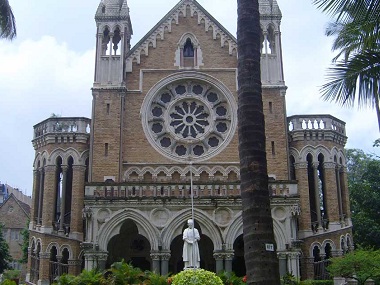The University of Mumbai is likely to get a new vice-chancellor by the end of April, according to reports. The selection committee, headed by noted scientist and former ISRO chief K Kasturirangan,
has shortlisted 32 candidates, who will be interviewed on 13 and 14 April. The interviews will reportedly take place at the CIDCO office in Nariman Point. “Thereafter, five candidates will be selected for an interaction with the chancellor,” a
report quoted a government source as saying. The university has been without a vice-chancellor ever since
the post was vacated by Sanjay Deshmukh , who was sacked following the criticism that the varsity faced over the delayed announcement of examination results owing to a unprepared and half-baked implementation of a digital assessment system. [caption id=“attachment_3877593” align=“alignleft” width=“380”] File image of Mumbai University. Image courtesy Wikimedia Commons[/caption] The panel had received 102 applications for the post of vice-chancellor,
of which 64 were shortlisted for interviews. BL Jadhav (Dept of Life Sciences), Jyotshana Prajapat (Mathematics), Karunashankar Upadhyaya (Hindi), Gautam Gawali (Psychology), Vibha Surana (German) and Dr Vishnu Sarvade (Hindi) of the Mumbai University; Kiran Mangaokar, principal of Khalsa college; and Suhas Pednekar, principal of Ruia College
were among those who had applied for the post. Acting vice-chancellor of Mumbai University Devanand Shinde, who is also the vice-chancellor of Shivaji University, did not apply for the post. Of the 64 candidates who were shortlisted for the role of vice-chancellor,
some prominent names included Khalsa College principal Kiran Mangaonkar, Mumbai University commerce professor Vivek Deolankar and VJTI professor BB Meshram. The call for the resignation of Deshmukh had
gained momentum slowly after the long delay in declaration of results of over four lakh Mumbai University students. After several postponements and confusion that lasted nearly four months, the varsity
finally declared results for April-May exams in September 2017. The results should have ideally been announced in June-July. On 26 September, Governor C Vidyasagar Rao had sought Deshmukh’s resignation, failing which he could face dismissal,
The Times of India had reported. The vice-chancellor had also
violated Section 11 (14) and 89 of the Maharashtra Public Universities Act as he did not submit a report to the chancellor, stating his failure to announce results before the deadline. Instead, he applied for leave “for personal reasons” on 9 August Rao then appointed Shinde as acting vice-chancellor of Mumbai University with immediate effect. The
selection panel was constituted simultaneously to appoint a new vice-chancellor. The committe also comprises of Uttarakhand National Institute of Technology director Shyam Lal Soni as the University of Mumbai nominee and CIDCO MD Bhushan Gagrani as the state government nominee, besides Kasturirangan. Deshmukh had also failed to take into consideration the
staff crunch in the university . Since 1985, the number of colleges affiliated to the university has gone up to 748. The staff, even the non-teaching staff, is inadequate to handle the increasing workload. An
analysis of the online process had revealed that the infrastructure required for the implementation of the ambitious new idea was highly inadequate; that examiners were not equipped with sufficient training and information; and the poor coordination between various agencies responsible for different tasks had paralysed the whole process.
The University of Mumbai is likely to get a new vice-chancellor by the end of April. The selection committee, headed by noted scientist and former ISRO chief K Kasturirangan, has shortlisted 34 candidates, who will be interviewed on 13 and 14 April at Nariman Point
Advertisement
End of Article


)

)
)
)
)
)
)
)
)



